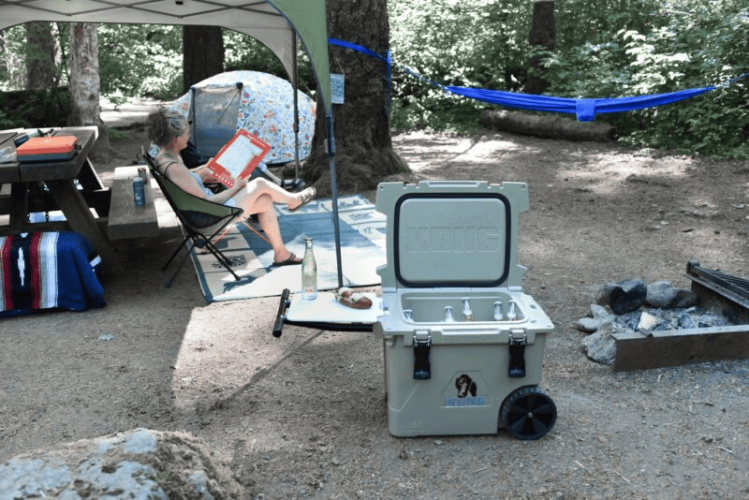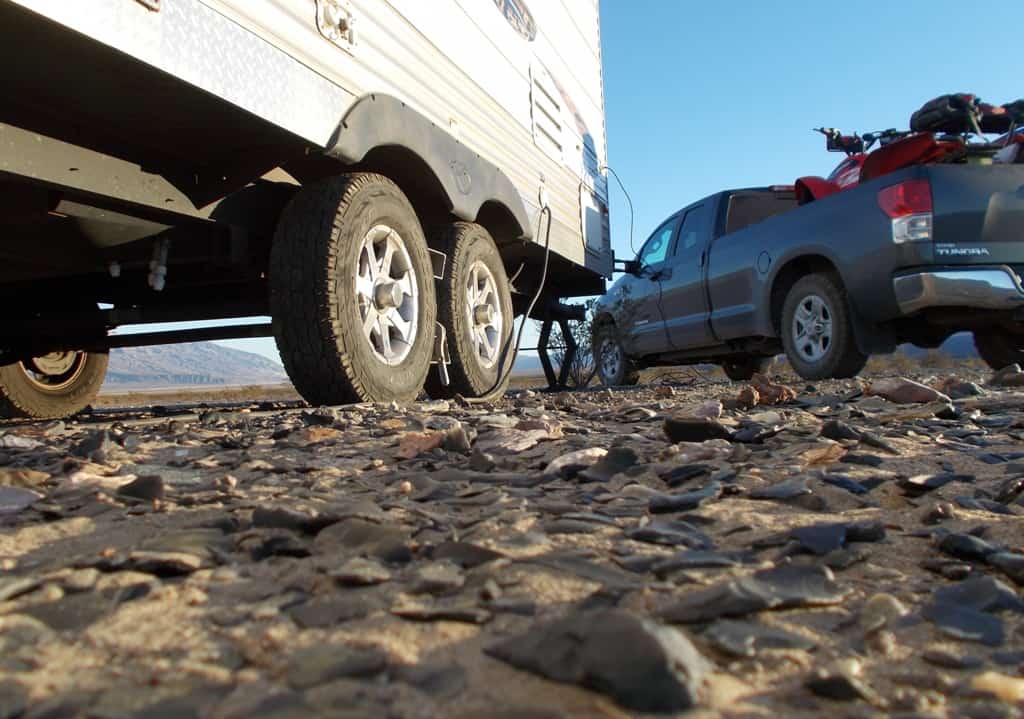Shopped for a new RV lately? Then you know that 12-volt RV refrigerators are more common than ever. These compressor refrigerators seem great, but if boondocking is in your future, there are truths you need to know before owning a fridge that only runs on 12-volt power.
RVers are Buzzing About 12-volt RV Refrigerators
For decades, RVs came standard with a gas /120-volt AC electric absorption refrigerator. However, in recent years more and more manufacturers have opted to install 12-volt compressor driven refrigerators instead.
The switch to this type of RV fridge seems like a great idea for RV travel. After all, 12-volt RV refrigerators can be powered by a properly equipped tow vehicle when you are traveling down the road. Forget all those safety concerns about driving with the propane on!
The internet is filled with articles and RV forum discussions about 12-volt RV refrigerators.
RV salespeople and factory representatives also have a lot to tell you about 12-volt refrigerators. Some of what you read / hear is the truth, while other information is questionable.
One thing that cannot be disputed are the truths regarding 12-volt refrigerators (along with the advantages and disadvantages). Here are a few truths. Note: Not all of these truths may be considered beneficial.
Top Truths About 12-volt RV Refrigerators
Two big disadvantages of an RV compressor fridge include:
There is very little dispute between RVers that the above information is the truth about 12-volt RV refrigerators.
Why Do New RVs Have 12-volt RV Refrigerators?
During the Covid 19 pandemic, demand for RVs soared as they were deemed the safest way to travel. However, the pandemic also caused widespread product shortages and supply chain issues.
RV manufacturers couldn’t build RVs fast enough to meet public demand. If their regular suppliers couldn’t supply the components needed in a timely manner, they found other suppliers and products to complete the RV.
This type of RV fridge could be readily supplied. And it cost less, too. In addition, they were easier to install, as there is no need for exterior vents, no need to run a propane line, and no need to install a 120-volt outlet.
With the influx of first time RV buyers during the pandemic, newbies didn’t know a 12-volt RV refrigerator from a gas / electric absorption refrigerator. It was just a refrigerator in an RV that was available for immediate purchase. They quickly bought it before someone else did.
- Since the pandemic, 12-volt RV refrigerators have become all the rage. They standard equipment in nearly every new RV today.
Unfortunately, many looking at new RVs equipped with 12-volt RV refrigerators are only told the advantageous truths listed above. Rarely do they discover the truths about 12-volt RV refrigerators when it comes to dry camping.
The Biggest Disadvantage of 12-volt RV Refrigerators.
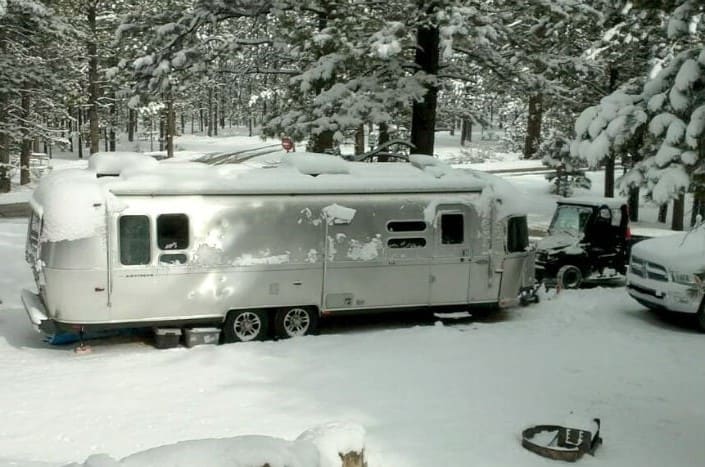
(Image: @iRV2 Discussion Forums)
Do you enjoy dry camping like I do? If so, you’re in for a surprise when you discover the biggest disadvantage of 12-volt RV refrigerators.
Sadly, many RV salespeople or factory reps don’t understand these drawbacks and limitations. They believe what they have been told to say concerning how long RV house batteries can run a 12-volt RV refrigerator.
What RV sales reps say about using RV compressor refrigerators while boondocking.
At a recent RV show, a factory representative told me that the 10 cu. ft., 12-volt refrigerator in his RV can operate 57 hours on one “small” 12-volt battery.
Other manufacturer reps at the same RV show suggested upgrading to lithium house batteries and solar RV power to sustain the power needs of a 12-volt RV refrigerator for “extended” periods of boondocking (more than 1 day).
Better Carry Your Old Camping Cooler
These reps had no suggestions for RVers faced with camping in other conditions not favorable for running a 12-volt RV refrigerator on solar. A good example is when you’re camping in a heavily treed national park campground loop, where generators are prohibited. Glacier’s Fish Creek Campground is a perfect example.
I guess it is back to buying ice for the camping cooler!
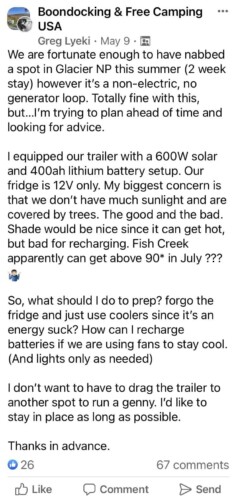
Back to ice in the cooler for this RVer!
How Long will House Batteries Power a 12-volt RV Refrigerator?
There are many discussions concerning this topic online. All agree on “not long.” But also state that length of time is also dependent on factors including:
- Ambient temperature
- How often the door is open?
- Duty cycle
- How much product is inside the refrigerator?
- Thermostat setting
- The size / type / number of RV house batteries
I wanted the truth about how long house batteries will power a 12-volt RV refrigerator. So I visited the websites of manufacturers, like Dometic, Furrion and Norcold. All supply 12-volt refrigerators to RV builders.

What 12-volt RV refrigerator manufacturers say
They all listed the voltage and amperage ratings required to operate their compressor refrigerators. But only Furrion listed the energy consumption. Furrion lists their 10 cu. ft. refrigerator model energy consumption at 1.08kWh per day.
No details were provided on how this number was calculated, but I suspect it was under ideal conditions. Plus, for someone just entering the RV lifestyle with little understanding of how RV systems operate, it does little to impress how this would impact their ability to dry camp. It also does not directly answer how long the refrigerator will operate on the house batteries.
- Note: 1.08kWh (Kilowatt Hour) equates to 90 amp hours per day.
What RV electrical experts say
Manufacturers gave no concrete answers to the question of how long RV house batters can power a 12-volt RV refrigerator. So I searched out RV experts who have taken the time to do measurable real world 12-volt RV refrigerator power tests.
First I turned to RV electrical expert Mike Sokol of RV Electricity. I know him personally and respect his knowledge and methods of testing.
Mike came up with the following results for a Dometic DMC 4101 12-volt RV refrigerator.
This one contains an auto defrost feature like other 12-volt RV fridge models. The following summarizes his findings.
Testing the Dometic DMC 4101 12-volt RV Refrigerator
“This fridge in Performance Mode would run around 20 hours on 100 amp-hrs of battery, 22 hours in Silent Mode, and 25.5 hours in Eco Mode. The run times could be longer once the defrost mode is disabled, but I don’t know that yet. But this is a good start on expected boondocking times.”
RV electrical expert Mike Sokol of RV Electricity
Authors note: Using the middle number of 22 hours to consume 100-amp hours equates to 120 amps per 24 hour day

Read the complete report here.
Testing the Vitrifrigo 8 cu. ft 12-volt Refrigerator
Mike also ran an independent test on the Vitrifrigo 8 cu. ft. 12-volt refrigerator featuring the Danfoss compressor.
“In my lab tests a few months ago, I was able to power it from a single 100 amp-hr Briter Products Lithium battery for over 30 hours before calling it quits with 5% of battery power left.”
RV electrical expert Mike Sokol of RV Electricity
Authors note: Running 30 hours and consuming 95 amp hours equates to 76 amps hours per day.
Read the complete report here.
Energy Consumption of 12-volt RV Refrigerators Surprises One Expert
Another associate I work with, Tony Barthel of Stress Less Camp had this to say after switching to an RV with a 12-volt fridge:
“One of the biggest surprises of 12 volt RV refrigerators is how much energy they consume. While we’ve been sold on the idea that a good RV battery, such as a lithium battery, can operate an 12 volt fridge for days, this is generally not true at all.
In fact a 12-volt RV refrigerator all by itself can go through all the energy in a single lithium battery in fewer than 24 hours.
Tony Barthel of Stress Less Camping.
This is not an issue if you have a decent way to refill the battery. But if you’re hoping the battery reserves alone will keep the beer cold, you might be in for a surprise. Further, don’t forget that other systems in the RV may also be drawing on the power in that battery.”
While I don’t have hard test results from Tony, the fact that a 12-volt RV refrigerator can go through a 100-amp hour lithium battery in less than a day tells us at a minimum the refrigerator requires 100 amps per 24-hour day. You can read his complete report here.
More Real World 12-volt RV Fridge Testing on House Batteries
Next I found this forum thread online which is administered by the parent company of the website you are reading this article on:

This post generated this response from @Jimbo K that spent the time to test, detail and document the current draw of another compressor fridge.
Real world power consumption test of the 12-volt GE 9.8 cu. ft. refrigerator/freezer, model # GPV10FSNBSB.
“To confirm (or refute) the dealer’s assertion that I could boondock with the refrigerator running for two days I ran a test of the effect of the refrigerator’s operation (plus parasitic draw and minus any current inflow from the solar juice pack) on the battery’s voltage and state of charge.
To assure a fully charged battery and proper refrigerator operating temperature, the RV was on shore power and the refrigerator turned on to its coldest setting for 36 hours before the test. At 9 AM on the day of the test I disconnected the shore line and started logging refrigerator temperature and, from a recently installed Victron SmartShunt, battery voltage and state of charge (SOC). The test would stop when the battery reached 12V or SOC reached 50%, whichever came first.
Results:
Time Voltage SOC Temp(F)
9AM 12.76 100% 36
10AM 12.70 96% 34
11AM 12.67 93% 34
12PM 12.64 90% 35
1PM 12.61 87% 36
2PM 12.54 83% 38
3PM 12.52 80% 39
4PM 12.43 76% 40
5PM 12.39 71% 40
6PM 12.31 66% 41
7PM 12.21 60% 41
8PM 12.11 54% 40
8:30PM 12.06 50% 40SmartShunt also records cumulative amp-hours after a history reset, which I did at the beginning of the test. That was 51Ah*, which I was happy with from a 100Ah off-brand lead-acid battery. But I can’t expect significant boondocking with this battery, in warm weather anyway, if the battery can’t power the fridge for 12 hours.”
*A 100 ah lead acid battery can only surrender 50% of its rated capacity without causing damage to the battery. In this test we see that 50 amps only operated the refrigerator for 11.5 hours. This quates to 104 amps per 24-hour day.
Read the complete report: GE 12V refrigerator: experience thus far and power consumption testing by @Jimbo_K, Member of the Forest River Forums
Authors note: While I don’t know the person who did this test, I do respect his testing methodology. I have no doubts the results are accurate given the effort to details.
Does the Government Test 12-volt RV Refrigerator Power Consumption?
Finally, I wanted to see if any governmental agency required testing and labeling.
*Learn about Energy Guide Labeling
Since RV appliances aren’t required to display an Energy Guide label, I did the next best thing for power consumption needs.
Testing Power Consumption of a 10 cu. ft. Energy Star-rated Residential Fridge.
Watts are watts when it comes to electrical power consumption. It doesn’t matter if the input is 12 volts, 120 volts or 240 volts. Using the label shown below, here is how the math works out:
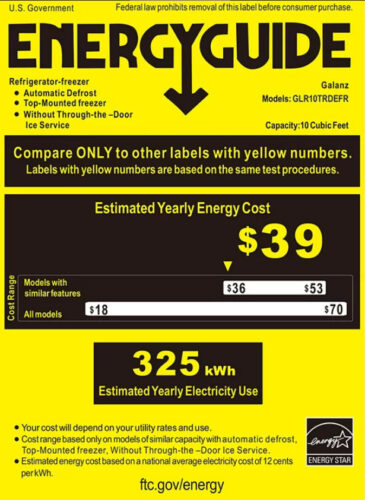
- 325 kWh equates to 325,000 watt hours.
- Using ohms law I divided 325,000 watt hours by 12-volts (watts / volts = amp hours). This equals 27,083 amp hours to operate the refrigerator for a year (365 days).
- Further dividing 27,083 amp hours by 365 days equals 74 amp hours per 24 hour day. This is nearly identical with Mike’s findings above (76 amp hours per day) for the Vitrifrigo 8 cu. ft. RV refrigerator.
- I highlighted the numbers in orange to illustrate the shortcomings of powering 12- volt RV refrigerators while dry camping.
Now consider the following reserve capacities of what are commonly used for RV house batteries:
- One 100-amp hour deep cycle lead acid battery contains 50 useable amp hours
- One 100-amp hour lithium battery contains 100* useable amp hours. * more info here
Based on these reserve capacities, if you use the most conservative figure listed above (74 amps per day) you will need two lead acid batteries or one lithium battery just to operate a 12- volt refrigerator for a day and a half. Double the number of batteries for 3 days, then double again for 6 days of dry camping.
How to Really Compare 12-Volt RV Refrigerators Compared to Absorption Models
Before I close there is one more truth I would like to share.
Many argue that 12- volt RV refrigerators are more energy efficient than gas / electric absorption fridge models. They do so by comparing the 12-volt electricity consumed by the 12-volt compressor, versus electricity consumed by the 120-volt heating element of a gas / electric absorption refrigerator.
This is not a fair energy comparison.
Absorption refrigerators were designed to operate on propane, not electricity. Electric elements were added as an auxiliary power source, as a convenience for RVers who wanted to conserve propane when hooked to shore power.
*More about energy density.
An accurate comparison looks like this:
Take one fully charged, single group 24-sized lithium battery:
- Volume: 577.7 cubic inches
- Energy contained: 12 volts x 100-amp hours = 1,200 watts hours or 1.2 kHw
And a full, one gallon propane cylinder*:
- Volume (approx): 544 cubic inches (source V= π h r squared)
- Energy contained: 91,500 BTUs or 27,000 watts hours (27 kWh) of electricity (source)
As the numbers demonstrate, one gallon of propane has 22.5 times the energy as one lithium battery.
But can an absorption refrigerator use 100% of the energy in one gallon of propane? No. Let’s look at some scenarios that explain why:
- Worst case – An 8 cu. ft. Dometic Gas / Electric refrigerator consumes 1,500BTUs an hour when actively cooling (burner on and consuming propane). Doing the math shows that the refrigerator will operate constantly for 61 hours on one gallon of propane.
- 91,500 BTUs per gallon divided 1,500BTUs per hour = 61 hours or 2.5 days
- More realistic or possibly best case – A 50% duty cycle. If the refrigerator cycles on / off 50% (750 BTUs per hour) of the time, the run time on a gallon of propane doubles.
- 91,500 BTUs per gallon divided 750 BTUs per hour = 122 hours or 5 days
Keep in mind the numbers above are only for one gallon of propane consumed. Typically, even the smallest RV has a five-gallon propane cylinder. In the worst-case scenario listed above, that is over 12 days of refrigerator run time. In comparison that would equate to no less than 8 lithium batteries, probably more.
A 30 lb propane tank holds up to 7 gallons of propane. A full tank of this size can weigh 55 lbs and can power your 8 cubic feet fridge that uses 1500 BTUs per hour for at least 18 days.
How Much Propane Does an RV Fridge Use? Outdoorbits
Conclusion: The Truth About 12-volt RV Refrigerators
There’s no arguing. 12-volt refrigerators cool faster, stay colder in hotter weather, are less expensive, easier to install in less space, and contain more useable interior space than gas / electric absorption RV refrigerators. They are great for those that stay in campgrounds offering shore power every night.
But if you can’t plug your motorhome or trailer into shore power at the end of a day’s drive, a 12-volt refrigerator quickly sucks the life out of the typical house battery bank.
If you want the ability to dry camp with a 12-volt RV refrigerator, you need to:
- Invest in a stout lithium battery bank to accommodate a 12-volt refrigerator.
- A sizeable RV solar system is also required.
- Or, you can run a noisy generator many hours per day to recharge your RV house batteries and annoy your campground neighbors.
And be prepared a worst-case-scenario.
- What happens to dry campers when the sun doesn’t shine?
- Or you are camped in a shady spot in the forest?
- Or the only available campsite in a national forest or national park campground is in the “No Generators Zone”?
In cases like this, a 12-volt RV refrigerator is not a viable option. A standard RV absorption refrigerator is the no brainer choice.
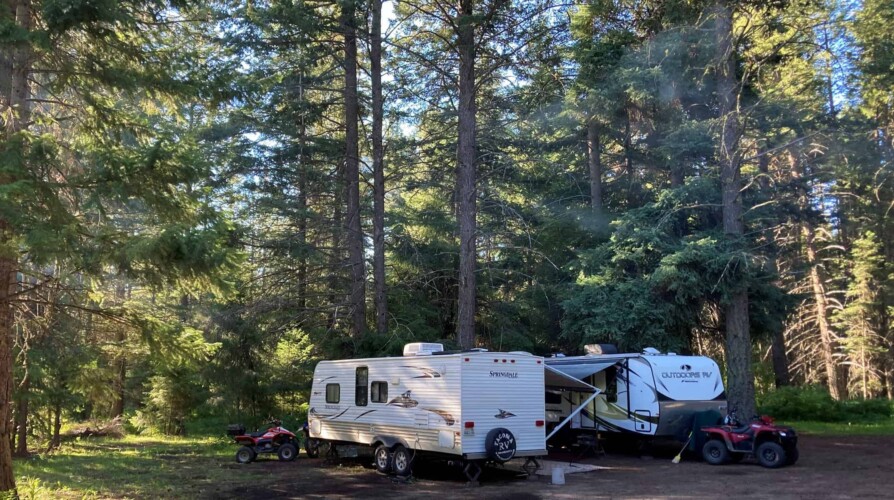
In closing, I urge you to understand the truths about 12-volt RV refrigerators. Do the math and decide for yourself.
A Note to RV Manufacturers
I understand why many of you switched to 12-volt RV refrigerators. But please offer an option for a gas / electric absorption refrigerator for those of us who enjoy the freedom of camping in uncrowded spaces away from utilities. After all, isn’t that the whole idea behind self-contained RVs and enjoying the RV lifestyle?


